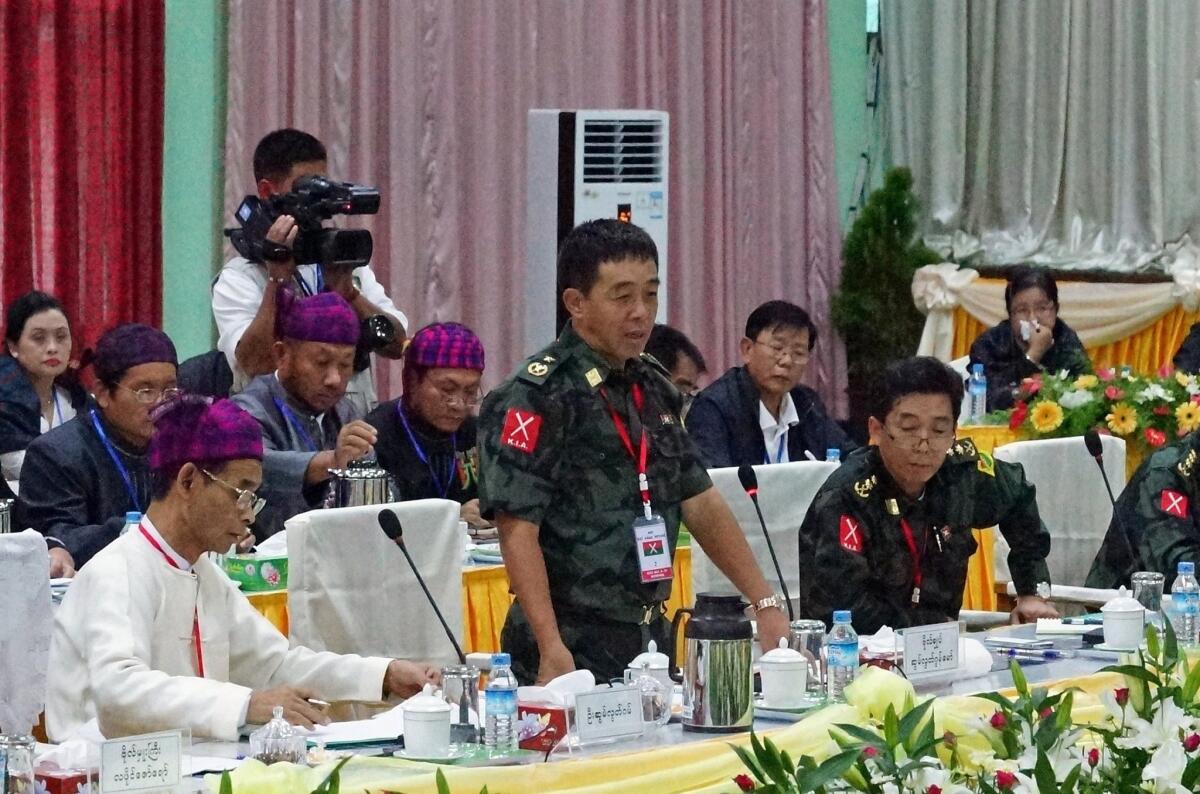Myanmar talks with Kachin rebels yield agreement but no cease-fire

- Share via
YANGON, Myanmar -- One day after a seven-point agreement was signed between ethnic Kachin rebels and the Myanmar government, analysts and members of the Kachin community expressed skepticism that this represented much of a breakthrough.
The two sides failed to agree on a cease-fire over three days of talks that ended Thursday in the Kachin state capital, Myitkyina, instead signing a pact that includes new rules for monitoring fighting and the resettlement of citizens as a result of clashes.
“Kachin people want political dialogue,” said Nawdin Lahpai, editor in chief of the Thailand-based Kachin News Group. “The government wants to eliminate the armed groups and have a cease-fire, but it isn’t willing to have political dialogue. They just ignore it.”
Since its move to a quasi-democracy in 2011, Myanmar has sought to stem fighting with ethnic groups so it can focus on developing its economy. Myanmar, also known as Burma, has some 130 official ethnic groups.
The Kachin are the only significant armed ethnic group that haven’t signed a cease-fire agreement. Fighting in Kachin, located near Myanmar’s northern border with China, has continued since a 17-year cease-fire broke down in June 2011, displacing some 100,000 people, according to the United Nations.
The government characterized Thursday’s agreement with the Kachin Independence Organization -- an umbrella group seeking greater autonomy -- as a significant step forward.
“We’re working not just towards a just and sustainable peace but towards a new political culture, one built on compromise, mutual respect and understanding,” said Aung Min, the minister representing the government at the talks, in a statement. “I’m confident that we are turning the corner.”
Even as negotiators met this week, however, fighting continued. On Monday, some 200 villagers fled clashes near the town of Bamao, according to Khon Ja, a coordinator for the Yangon-based Kachin Peace Network, a civic group providing aid to Kachin civilians displaced by the conflict.
Hundreds of other civilians were upended by fighting in the same area last week, she said, adding that it’s not known whether there were casualties in those clashes. The government typically does not report losses on its side.
Myanmar had hoped to reach a comprehensive accord by July. This goal was postponed to October and now to November.
The fact that clashes continued during a week of talks aimed at reducing tension calls into question the government’s chain of command, some said.
“Not only the government but the president himself cannot control the military,” Khon Ja said.
Human rights groups also have questioned how committed the military is to ending the conflict.
Matthew Smith, executive director of Fortify Rights, a Thailand-based watchdog, said the military and the Kachin Independence Army, the Kachin military wing, have both continued to enlist child soldiers and deploy land minds.
“Neither party had taken significant steps to address these abuses,” he said, adding that the government hasn’t given humanitarian aid groups enough access to citizens displaced by the violence.
Ethnic political groups, including the Kachin, met in northern Thailand on Thursday, pledging to draft within three months an alternative constitution they hope might replace Myanmar’s controversial document, which was written by and safeguards political control for the armed forces.
On Tuesday, the government released some 56 political prisoners in advance of a two-day meeting of the Assn. of Southeast Asian Nations in Brunei. More than a dozen of those freed were reportedly linked to the Kachin rebels.
Myanmar was named chair of the 10-member regional group on Thursday. The leadership role, which the country has long sought, underscores its growing international role but also places a brighter spotlight on its human rights record.
ALSO:
Two Canadians jailed in Egypt are on their way home
OPCW wins Nobel Peace Prize; group struggling to disarm Syria
Report: Syrian rebels targeted civilians in Assad’s home province
Twitter: @katelinthicumkate.linthicum@latimes.com
Twitter: @markmagnier
Staff writers Linthicum reported from Yangon and Magnier reported from New Delhi.
More to Read
Sign up for Essential California
The most important California stories and recommendations in your inbox every morning.
You may occasionally receive promotional content from the Los Angeles Times.














